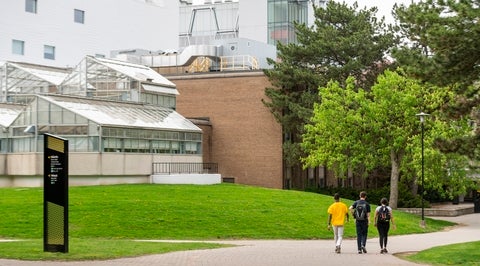
Welcome new Biology faculty members
The Biology department extends a warm welcome to Michael Bording-Jorgensen and Travis Craddock
By Vanessa Parks
Internal Communications and Engagement Specialist
The Biology department is pleased to introduce two new faculty members, Michael Bording-Jorgensen and Travis Craddock. With their expertise in health and diagnostics, both Bording-Jorgensen and Craddock are helping to build on our leadership and expertise as we work toward the future of healthcare. Take a moment to say hello if you see them on campus this fall.
Michael Bording-Jorgensen

Michael Bording-Jorgensen has always loved teaching and can’t wait to engage with students in class this fall. Bording-Jorgensen joins the department from McMaster and the University of Alberta, where he completed several research-based postdocs in physiology and pediatrics studying inflammatory bowel disease. This is his first teaching-focused position.
“I’ve always loved teaching. Coming from a research background, teaching was always kind of put on the side. But I loved it so much that I took courses in teaching alongside my research. Now I get to take some of that and put it into practice,” reflects Bording-Jorgensen.
Bording-Jorgensen’s teaching is discussion based and brings real-world examples into the classroom. “I like to provide lots of relatable examples and engage in dialogue with students. Even in a large class, you can have that one-to-one conversation rather than throwing a bunch of information at them,” he says.
This fall, you will find Bording-Jorgensen teaching BIO 273: Human Physiology. But if you don’t catch him there, keep your eye out for him walking his instafamous dog @miss_chewy_belle.
Travis Craddock

His lab may still look a little bare right now, but Travis Craddock is excited to hit the ground running. He joins the Biology department from Nova Southeastern University in Fort Lauderdale, Florida. Craddock holds a Tier 1 Canada Research Chair in Quantum Neurobiology. His research focuses on developing new treatments and diagnostics for diseases like Alzheimer’s and Parkinson’s, using quantum physics to understand their processes at a molecular level.
Quantum biology offers a unique perspective on the treatment of these types of neuroinflammatory conditions, cases of which are expected to double or triple in the next 20 to 30 years. “We can take the route of standard drug discovery, looking for new or modifying existing pharmaceuticals, but we can also look at new avenues, such as using light or magnetic fields to change what’s going on in the cell,” Craddock says.
Craddock is excited to be doing this work at Waterloo. With like-minded colleagues and other universities close by, the greatest minds in the province are on his doorstep and productive collaborations are just a car ride away. “There’s a hub starting here, I can feel it,” says Craddock.
And his research lab is the perfect place to start. “I’m looking forward to directing the focus of research into areas that I find really interesting and have real-world applicability,” says Craddock. Soon, his lab will be populated with undergraduates, graduate students and postdocs working together to apply principles of quantum biology to the treatment of real-world disease.